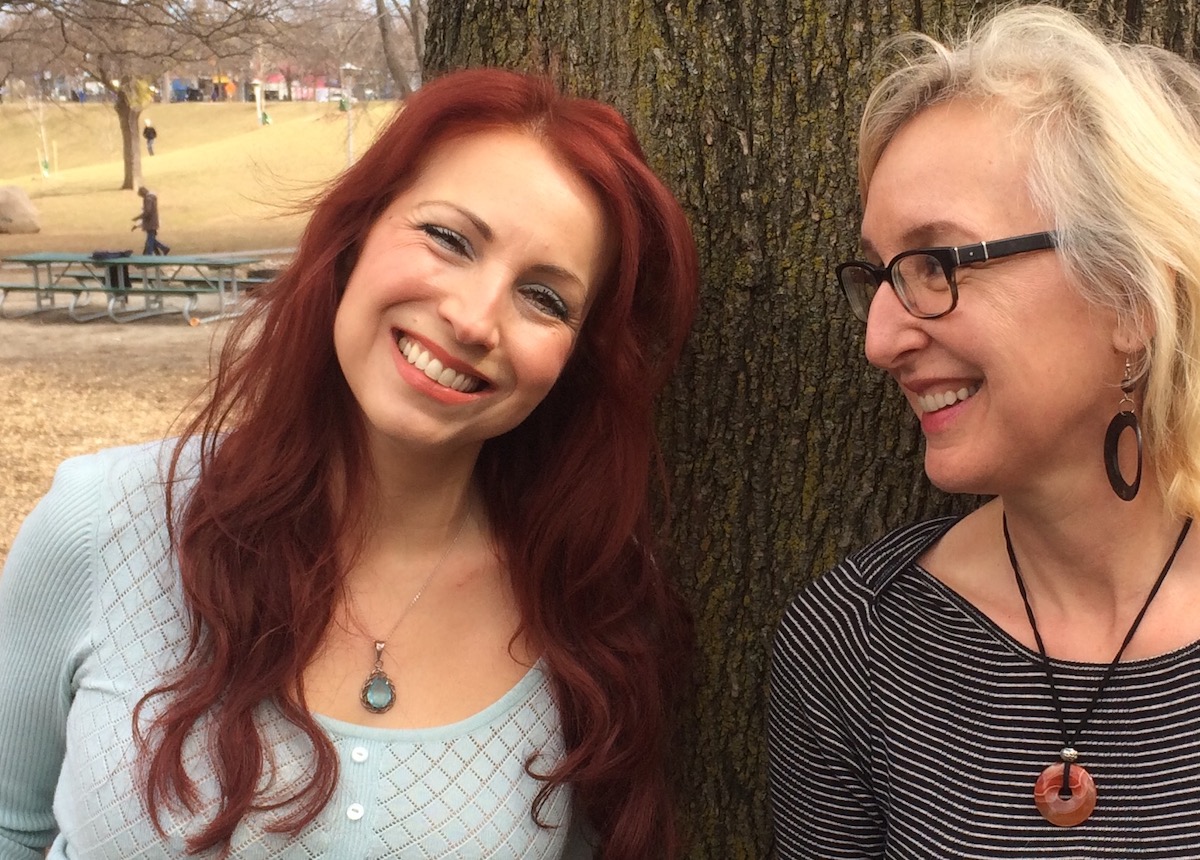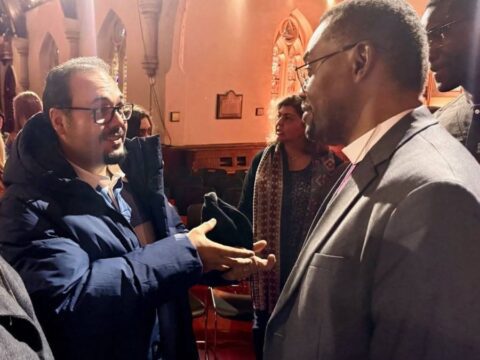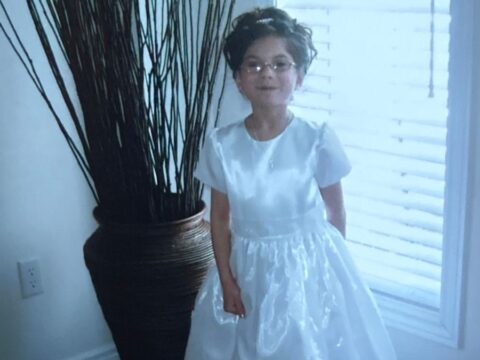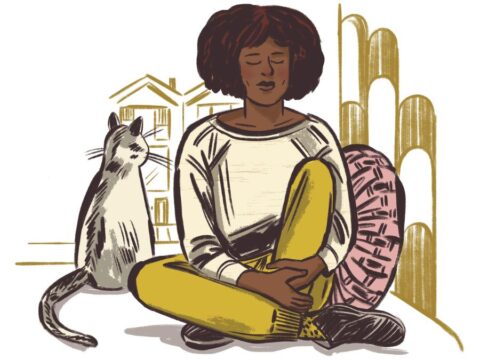I’m nervously perched on a red velvet couch, in the comfy, second-floor loft of a spacious Toronto duplex. The scent of white sage wafts through the air and a fire blazes in the hearth while the February snow whips itself into a froth outside. Flickering candles and white tulips — a delicate promise of spring — adorn the mantle. Surrounding me are eight strangers, who will be my fellow sojourners as we dive into our psyches over the next seven Tuesday evenings. We’ve signed up for a course led by Kimberly Carroll, a mind-body-spirit coach known as the “Divine Redhead,” who promises to kick start our spiritual mojo with her 49-day “Life Reboot” program. Carroll’s a personal trainer for the soul. Instead of hoisting weights, she gets you doing some uplifting heavy lifting; rather than seeing how you measure up on a scale, she has you assess yourself in terms of how well you are living your values. Her mission: “To help you find your centre, love your life, and ignite your world.”
I’m ready to be fired up.
You may unsubscribe from any of our newsletters at any time.
As the ground thaws over the coming weeks, I’m hoping to plough into the soil of my soul and plant seeds for new spiritual practices that will enrich my life.
But this is the sort of thing that baffles my husband. “Why don’t you just take up gardening?” he asks.
There’s no shortage of mystics, yogis, shamans and sages to set me on a more soulful path. I didn’t need a guru, but I wanted the help of a spiritual guide. Carroll promises “loving support and kick-ass motivation” if you’re willing to “clear out the crap and jump start your life.” So I plunk down $700 in the hopes of gaining enlightenment.
In the celebrity world, gurus are as common as Hermès handbags. The Maharishi became famous as the spiritual advisor to the Beatles. Long before that, Yogi Rao caused a sensation when tobacco heiress Doris Duke, one of the richest women in the world, became his pupil. He taught her, among other things, how to use a neti pot to clear her sinuses. He also performed stunts such as eating nails, biting the head off a viper and swallowing acid, before heading back to India a much richer man.
I wasn’t in any danger of being duped, though. Carroll came highly recommended (Just check out the website testimonials of those who say she’s changed their lives.). She’s got a passionate personality to match her Jezebel-red locks. She combines the warrior-like attitude of the Biblical Jael (who was known to hammer a tent peg through the skull of an enemy in battle) with the ethereal essence of a worldly-but-saintly, alabaster-skinned Mary Magdalene. Carroll, 45, has lived many lives: a yogi on an ashram, a bohemian travelling Europe and doing performance art, and a high-profile host of the W Network home reno show, Take This House and Sell It. About 15 years ago, she realized that she was spending all of her energy chasing achievement. “I wasn’t happy; I was a mess,” she says. She began a journey of self-exploration that included practising Buddhism, personal development retreats such as the Hoffman Process, and a course of study with Denise Linn, founder of California’s International School of Soul Coaching. For the past eight years, she’s been helping people renovate their lives by restructuring their scaffolding. Her clients are stuck in challenging relationships, dissatisfied with their jobs, despairing over unfulfilled dreams, hurt from past wounds, aching for clarity about the future, mourning the loss of love and searching for more meaning and connection. “I’ve learned from doing this work that most people are in some sort of pain, no matter their background or privileges,” she says.
Our weekly gatherings include a group check-in, activities such as drumming and cathartic exercises such as writing a “venting” letter to a parent (that will never be sent or seen by anyone), followed by writing a letter of defense from that parent in which we imagine their particular struggles and regrets. We create an elaborate life timeline on a sheet of poster board, filling it with all of the positive and negative turning points that we’ve experienced, and look for treasures in the rubble — the opportunities for awareness and growth that might have come from any difficulties.
Carroll leads us in powerful guided visualizations. In one, she asks us to go back to a vulnerable time in our childhood. I think about when I was 10 and how I felt that I had lost some part of my mother after getting a new stepfather. I’m transported back to the small kitchen of our apartment and I see my old self, gangly and full of energy, simultaneously in love with my powder blue 10-speed and teen idol Leif Garrett — and working hard to mask the discomfort with my new family living arrangement. Carroll tells us to whisper a message in our child’s ear. My adult self leans into this girl to tell her that everything will be ok and to keep her spirit strong. When the lights go up and we open our eyes, I see that my face isn’t the only one streaked with tears.
There’s daily homework, too: a 10-minute recorded meditation and instructions for a couple of exercises. Some are straightforward: taking “breath breaks” by setting an hourly alert on our phone to remind ourselves to inhale deeply throughout our waking hours, clearing a corner or closet of clutter, eating a meal mindfully, making a list of our fears and our joys, experimenting with saying “no,” scheduling times to unplug from social media, committing to a small daily act of service and considering whether there’s someone in our life who we need to apologize to or forgive.
Other exercises are more challenging: writing a personal creed, examining the limiting beliefs and patterns of behaviour that might be holding us back (and figuring out where those beliefs come from), identifying our core values and determining if we are really living them, and taking a look at our “shadow selves,” the parts of which we’re not proud. We set three key goals for the year and map out how we will work toward them, month by month. And we each create our own list of regular soul practices that we promise to commit to: anything from setting a daily intention to creating a morning mantra, taking a daily dance break or walk in nature, meditating and keeping a gratitude list.
This is the kind of stuff that makes a lot of people squirm. But the keener in me embraces every exercise as if it will leapfrog me straight to a higher plane of consciousness. And my extroverted self never tires of all the talk. Still, there a few things that I want to wriggle out of, such as the mirror exercise where we’re supposed to gaze at our reflection for a full minute and try to muster up self-compassion instead of criticism. Doing this, I feel like a stranger in my own skin; I never look deeply into my own eyes unless it’s to examine the crow’s feet nesting at the edges. And I can’t quite embrace the “toxic fling,” a cathartic activity in which you imagine physically pulling a negative thought or feeling out of your body as if it were a thick gooey rope, flinging it to the ground and stomping it to bits. I’m just too polite to properly pull it off.
“Only you can heal yourself,” Carroll tells us. “Each of you has all the answers you need inside you.” All we have to do is move past our intellect, connect with our intuition, banish negative thoughts, forgive our parents, harness our inner wisdom, connect to our joy, find our purpose and live in the present. None of this is easy, of course. All of it takes work. Forty-nine days is just a start.
It’s easy to dismiss these exercises as self-indulgent. But, ultimately, isn’t it true that you have to fix yourself before you can really love the world? Carroll encourages her clients to make social action part of their life plan. And she practices what she preaches, helping to run Canada’s only vegetarian food bank and working as a director of the animal protection organization, Animal Justice.
Group sharing isn’t the focal point of our gatherings, but secrets inevitably spill out. One person is trying to gather the courage to leave a marriage, another struggles with the challenging behaviour of a child, a young man wants to forgive his father, a beautiful young woman is recovering from betrayal, an older man still weeps when he recalls the damage done by his long-dead mother. I share some secrets too. One is that I sometimes believe I’m unlovable and that I’m not good enough.
The greatest commandment, we’re told, is to love our neighbour as ourselves. But what if you have trouble loving yourself? According to Carroll, this problem is endemic. “Most people don’t have much of a relationship with themselves, and any relationship they do have is a critical one; they beat themselves up constantly,” she says. “When there is turmoil inside us. we bring that turmoil to our relationships and the world around us. That’s why there are so many people who aren’t at peace with themselves. We can’t be of powerful service to the world until we’ve learned to connect with and nourish ourselves.”
She blames original sin. “We’ve been raised with this insidious idea that we’re essentially bad, that we need to prove ourselves and make ourselves good.”
Certainly, my Calvinistic upbringing had a big focus on the depravity of man. And there are other factors that contribute to a legacy of unlovability: the early desertion of my father, broken relations with my fundamentalist family due to religious differences and a perfectionistic streak that makes me feel I’m worthy only if I’m pleasing others or accomplishing something.
I was raised to believe that I was a sinner, even though I was never really sure what I’d done wrong. Intellectually, I had left this sort of thinking behind, but I had to give that old skeleton a shake — and lay it to rest once and for all.
“Remember, you have been criticizing yourself for years and it hasn’t worked,” writes Louise Hay, author of You Can Heal Your Life. “Try approving of yourself and see what happens.” In the end, the takeaway from my life reboot is learning to like myself a little more. So I’m working on being as kind to myself as I try to be to others. Love is an inside job, they say. The more compassion we have for ourselves, the more of it we can extend to others.
It’s taken me a long time — and a little help from a soul coach — to realize that I’m good enough just as I am. I don’t have to earn love. I don’t have to prove anything.
And now, if you’ll excuse me, I’m going to go stare at myself in the mirror for a while.
I plan to ignore the crow’s feet.














